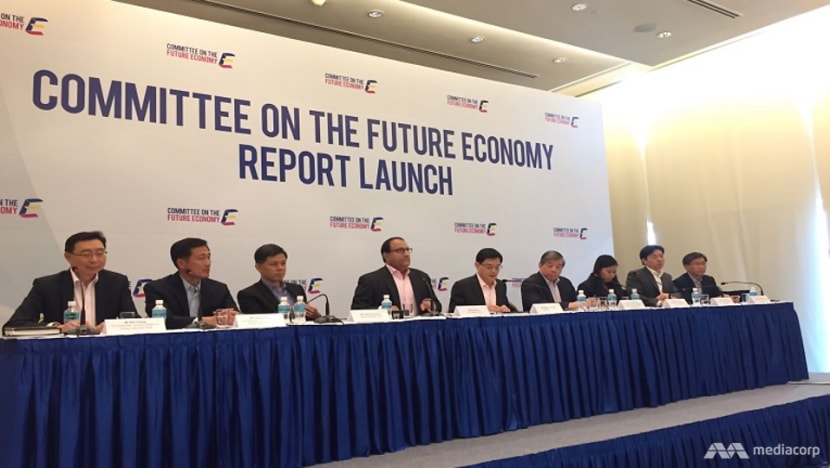commentary Singapore
Commentary: Intellectual property is making today's ideas tomorrow's assets
The commercialisation of intellectual property can be a growth engine for Singapore's future economy, says chief executive of the Intellectual Property Office of Singapore Daren Tang.

In a new economy, where the focus of IP is moving from protection towards commercialisation, the Intellectual Property Office of Singapore must also evolve. (Photo: CNA)
SINGAPORE: Innovation has become a buzzword that appears regularly in news headlines and social media feeds. Enterprises incorporate it into their taglines and governments everywhere want to know how to use it to drive their economies.
But what exactly is innovation? For the Intellectual Property Office of Singapore (IPOS), innovation equates ideas that bring actual economic or social value. But an idea remains an idea until it makes a difference to the world.
The process by which this happens is not easy. Part of it arises from market demand and the ability of the enterprise to scale and deliver value. Yet increasingly, enterprises in Asia are beginning to understand that intellectual property (IP) is the secret sauce in innovation.
As we advance towards a future that is increasingly driven by innovation and a knowledge economy, it is important that we think about IP in a totally different way, one that aids enterprise and economic growth. To help with this, we would like to present two new ways of looking at IP.
First, IP is not about law; it is about business. IP can be technical and this scares away many business owners who see it as something best left to professionals. Of course, professionals should be involved but business owners who do not understand how IP is really about business will miss a tremendous opportunity to make use of IP to generate even more revenue and drive enterprise growth.
IP can give its owners a monopoly over its technology, brand or content. This monopoly is rarely given to any other aspect of one’s business operations. Once business owners understand how to make use of this, IP can not only prevent free-riding of one’s ideas by competitors, but also act as a vehicle to attract partners and funds.
More and more successful and innovative companies in Asia have begun to incorporate IP into their business strategy. This is why - for the first time in human history - Asia is now leading the world in terms of patent and trade mark filings.
Second, to take our place in the new economy, we should go beyond IP protection to focus on IP commercialisation. As markets in Asia become more sophisticated, the focus in IP is shifting away from protection to commercialisation. The process will take some time but it is inevitable as Asian enterprises and people start to become creators and innovators rather than consumers of foreign innovation. Singapore, which is often ranked as having the top IP regime in Asia, should move boldly into this.

The focus on commercialisation does not mean that protection is no longer important. Indeed, there is a mantra in the IP community that goes: “Innovation without protection is charity.” But too often, we equate protection with filing an IP and see this as the end-goal. This thinking is too narrow. Registering a patent, trade mark or design is just a way-station along the journey of taking an idea to market.
THE ROLE OF IPOS
Rethinking IP’s role in our economy requires imagination, openness and expertise. It will take some time, but it is important and we will be working with partners in the public and private sectors to do so.
To contribute to this important effort of helping our future economy, IPOS will also have to evolve beyond being a registry and regulator to becoming an innovation agency. We have spent many years building deep IP expertise and extensive networks, and we will use these to help our entrepreneurs and enterprises grow their IP commercialisation strategies.
INNOVATE FOR SUCCESS - A LOCAL STORY
Often, we look to Japan, Korea or the Western developed countries for examples of companies that are genuinely admired for being able to innovate for the market. However, in Singapore, there are companies that have been able to do this well.
Winner of the IPOS Award for Design Innovation 2016, Innosparks is the company behind the popular (and very comfortable) Air+ Smart Mask. At the heart of this amazing product is an innovation designed to meet consumers’ needs and supported by a well-thought through and executed IP strategy.
During the peak of the 2013 haze season where the Pollutant Standards Index (PSI) exceeded 400, Innosparks took on the challenge to develop protective masks for children and the vulnerable. There were no masks which offered a good fit for Asian faces or wearable comfort for children and adults then.
Within a year of research and development (R&D), Innosparks developed a suite of inventions to create the mask they had envisaged - with an attachable micro fan and accompanying smart valve, tailor-fit for Asian facial profiles, and a sizing ruler for measuring mask sizes.

Recognising that these components were novel and first in the world, Innosparks sought a combined protection of patent, design, and trade mark for their Air+ Smart Mask in key destination markets. This ring-fenced their IP effectively and helped differentiate the Air+ Smart Mask from similar competing products. It deterred copycats and helped Innosparks establish a monopoly and a position of strength in its target markets.
As a result of AIR+ Smart Mask’s success in Singapore, Innosparks has since established a technology licensing partnership with global consumer health company RB-Dettol (formally Reckitt Benckiser) and entered the China market as Dettol Protect+ Smart Mask. Today, the product is available throughout major Chinese cities such as Beijing, Shanghai, Tianjin and Guangzhou.
MAKING TODAY’S IDEAS TOMORROW’S ASSETS
The Committee on the Future Economy (CFE) report provides a clarion call that innovation is key in building a competitive and forward-looking economy. We have a strong IP regime, but this is just the foundation. We must now also focus on equipping our innovators and companies with IP skills and know-how, and build a vibrant IP and innovation ecosystem for enterprise and economic growth.
In the days ahead, IPOS and the Ministry of Law will be releasing an update to our 2013 IP Hub Master Plan. The updated plan will detail how we can support the key recommendations on innovation put forth in the recent CFE Report. This includes initiatives and new collaboration that will help IP-rich companies scale up and internationalise, as well as more IP tools and assistance to local businesses, to help them better understand and develop IP strategies.
There is no stopping the momentum of global innovation and transaction of ideas. Being a small nation, Singapore will always need to adapt quickly and stay relevant in the competitive global economy. IPOS will continue to play an instrumental role in driving IP commercialisation and enterprise growth for a future-ready Singapore.
Daren Tang is chief executive of the Intellectual Property Office of Singapore.















